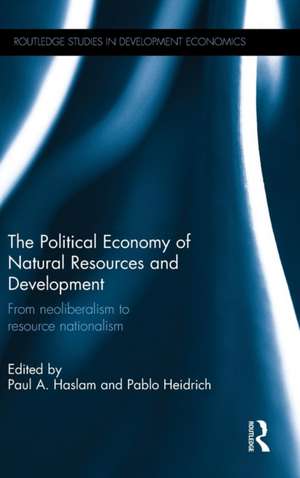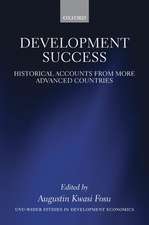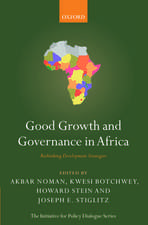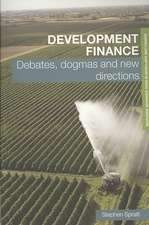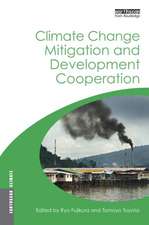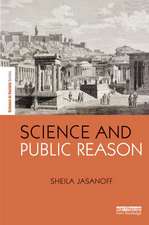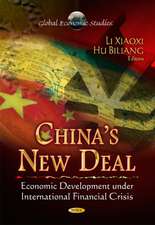The Political Economy of Natural Resources and Development: From neoliberalism to resource nationalism: Routledge Studies in Development Economics
Editat de Paul A. Haslam, Pablo Heidrichen Limba Engleză Hardback – 17 feb 2016
However, these innovations, which constitute the most dramatic change in development policy in Latin America since the advent of neoliberalism, have so far received little attention from either academic or policy-oriented publications. This book explores the reasons behind these policies, and their effects on states, firms, and development trajectories. This text brings together renowned thematic experts to examine the political-economic causes of resource nationalism, as well as its manifestation in six Latin American countries. The causal variables considered by the contributors to this collection include a range of political-economic determinants of policy including commodity prices; the influence of ideology and national politics; ideas about industrial policy; relations between host governments and investors; and how countries respond to opportunities provided by regional initiatives and the new geography of the global economy.
This volume is essential reading in development economics, political economy, and Latin American studies, as well as for those who want to understand what economic development means after neoliberalism.
| Toate formatele și edițiile | Preț | Express |
|---|---|---|
| Paperback (1) | 417.78 lei 6-8 săpt. | |
| Taylor & Francis – 18 oct 2018 | 417.78 lei 6-8 săpt. | |
| Hardback (1) | 1057.89 lei 6-8 săpt. | |
| Taylor & Francis – 17 feb 2016 | 1057.89 lei 6-8 săpt. |
Din seria Routledge Studies in Development Economics
-
 Preț: 309.74 lei
Preț: 309.74 lei -
 Preț: 327.17 lei
Preț: 327.17 lei -
 Preț: 326.49 lei
Preț: 326.49 lei -
 Preț: 311.41 lei
Preț: 311.41 lei -
 Preț: 394.37 lei
Preț: 394.37 lei - 8%
 Preț: 396.84 lei
Preț: 396.84 lei -
 Preț: 260.82 lei
Preț: 260.82 lei - 18%
 Preț: 1165.24 lei
Preț: 1165.24 lei - 15%
 Preț: 470.31 lei
Preț: 470.31 lei - 18%
 Preț: 1057.05 lei
Preț: 1057.05 lei - 18%
 Preț: 1225.29 lei
Preț: 1225.29 lei - 18%
 Preț: 1113.63 lei
Preț: 1113.63 lei - 18%
 Preț: 1300.62 lei
Preț: 1300.62 lei - 26%
 Preț: 878.42 lei
Preț: 878.42 lei - 18%
 Preț: 1166.05 lei
Preț: 1166.05 lei - 18%
 Preț: 1059.45 lei
Preț: 1059.45 lei -
 Preț: 381.11 lei
Preț: 381.11 lei - 25%
 Preț: 823.63 lei
Preț: 823.63 lei - 21%
 Preț: 361.84 lei
Preț: 361.84 lei - 16%
 Preț: 274.01 lei
Preț: 274.01 lei - 18%
 Preț: 1060.87 lei
Preț: 1060.87 lei - 18%
 Preț: 1168.85 lei
Preț: 1168.85 lei - 18%
 Preț: 1171.89 lei
Preț: 1171.89 lei - 18%
 Preț: 1068.18 lei
Preț: 1068.18 lei - 18%
 Preț: 1060.19 lei
Preț: 1060.19 lei - 18%
 Preț: 1341.98 lei
Preț: 1341.98 lei - 18%
 Preț: 1169.16 lei
Preț: 1169.16 lei - 18%
 Preț: 1057.05 lei
Preț: 1057.05 lei - 15%
 Preț: 708.81 lei
Preț: 708.81 lei - 18%
 Preț: 1287.06 lei
Preț: 1287.06 lei - 18%
 Preț: 1124.73 lei
Preț: 1124.73 lei - 18%
 Preț: 1157.34 lei
Preț: 1157.34 lei - 27%
 Preț: 832.80 lei
Preț: 832.80 lei - 26%
 Preț: 850.91 lei
Preț: 850.91 lei - 18%
 Preț: 1066.79 lei
Preț: 1066.79 lei - 25%
 Preț: 658.19 lei
Preț: 658.19 lei - 25%
 Preț: 992.63 lei
Preț: 992.63 lei - 18%
 Preț: 1069.23 lei
Preț: 1069.23 lei - 15%
 Preț: 703.08 lei
Preț: 703.08 lei -
 Preț: 395.63 lei
Preț: 395.63 lei - 18%
 Preț: 706.91 lei
Preț: 706.91 lei -
 Preț: 419.92 lei
Preț: 419.92 lei - 18%
 Preț: 1055.38 lei
Preț: 1055.38 lei - 27%
 Preț: 993.85 lei
Preț: 993.85 lei - 18%
 Preț: 707.10 lei
Preț: 707.10 lei -
 Preț: 409.19 lei
Preț: 409.19 lei
Preț: 1057.89 lei
Preț vechi: 1290.10 lei
-18% Nou
Puncte Express: 1587
Preț estimativ în valută:
202.42€ • 211.35$ • 167.53£
202.42€ • 211.35$ • 167.53£
Carte tipărită la comandă
Livrare economică 04-18 aprilie
Preluare comenzi: 021 569.72.76
Specificații
ISBN-13: 9781138919730
ISBN-10: 113891973X
Pagini: 262
Ilustrații: 20 black & white illustrations, 20 black & white tables, 20 black & white line drawings
Dimensiuni: 156 x 234 x 16 mm
Greutate: 0.54 kg
Ediția:1
Editura: Taylor & Francis
Colecția Routledge
Seria Routledge Studies in Development Economics
Locul publicării:Oxford, United Kingdom
ISBN-10: 113891973X
Pagini: 262
Ilustrații: 20 black & white illustrations, 20 black & white tables, 20 black & white line drawings
Dimensiuni: 156 x 234 x 16 mm
Greutate: 0.54 kg
Ediția:1
Editura: Taylor & Francis
Colecția Routledge
Seria Routledge Studies in Development Economics
Locul publicării:Oxford, United Kingdom
Public țintă
Postgraduate and UndergraduateCuprins
INTRODUCTION 1. From Neoliberalism to Resource Nationalism: States, Firms and Development PAUL A. HASLAM AND PABLO HEIDRICH PART 1: The Political Economy of Resource Nationalism 2. Trends in Minerals, Ores and Metals Prices SAMUEL K. GAYI AND JANVIER D. NKURUNZIZA 3. Rise of state-firm bargaining in the 2000s VLADO VIVODA 4. The Emergence of Industrial Policy Lite: Latin America’s Blind Spot ANIL HIRA 5. Regional Trends and Context for Latin American Resource Nationalism PABLO HEIDRICH 6. Natural Resource Nationalisms and the Compensatory State in Progressive South America EDUARDO GUDYNAS PART 2: From Limited to Radical Resource Nationalism: The Country-Cases 7. The Liberal Rarity of South America: Oil and Mining Policy Reform in Colombia in the 2000s CARLOS CABALLERO ARGÁEZ AND SEBASTIÁN BITAR 8. Mexico´s New Wave of Market Reforms and its Extractive Industries JUAN-CARLOS MORENO-BRID AND ALICIA PUYANA 9. Resource Nationalism and Brazil’s Post-neoliberal Strategy JEWELLORD NEM SINGH AND ELIZA MASSI 10. Mining policies in Humala’s Peru: A Patchwork of Improvised Nationalism and Corporate Interests JAVIER ARELLANO-YANGUAS 11. Resource Nationalism in the Plurinational state of Bolivia LORENZO PELLEGRINI 12. Resource Nationalism and the Bolivarian Revolution in Venezuela DANIEL HELLINGER CONCLUSION 13. Towards a Theory of Resource Nationalisms PAUL A. HASLAM AND PABLO HEIDRICH
Descriere
The Political Economy of Resources and Development offers a unique and multidisciplinary perspective on how the commodity boom of the mid-2000s reshaped the model of development throughout Latin America and elsewhere in the developing world. Governments increased taxes and royalties on the resource sector, the nationalization of foreign firms returned to the mainstream economic policy agenda, and public spending on social and developmental goals surged. These trends, often described as resource nationalism, have developed into a strategy for economic development, generated a re-imagining of the state and its institutional possibilities, and created a new but very significant political risk for extractive enterprises.
